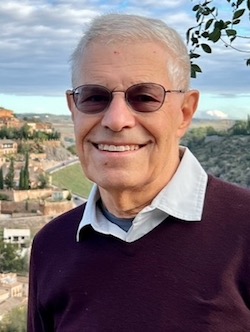By American Association of Physics Teachers®
College Park, MD, August 21, 2024—Fred Goldberg has been named as the 2025 recipient of the prestigious Hans Christian Oersted Medal, presented by the American Association of Physics Teachers (AAPT). The Medal will be awarded at a Ceremonial Session of the AAPT Winter Meeting where he will also deliver a plenary lecture. The Oersted Medal recognizes his outstanding, widespread, and lasting impact on the teaching of physics.
Goldberg is Emeritus Professor of Physics at San Diego State University where he has been involved in research, curriculum development, and teacher professional development in physics education, working with students and teachers throughout the entire educational spectrum, K-16. He was the recipient of AAPT’s 2003 Robert A. Millikan Award. He was also a 2007 Fulbright Senior Specialist, visiting scholar to Israel and in 2014 he was elected as a Fellow of the American Association of Physics Teachers.

Regarding his selection to receive the Oersted Medal, Goldberg said, “I am very honored to be selected for this prestigious award, and to join a list of distinguished physicists and physics educators who have been previous recipients.”
His research and development efforts have focused in three main areas: (1) Developing activity-based physics and physical science curricula for preservice and in-service elementary teachers to be used in both small and large (lecture-style) classroom environments and investigating student learning in these environments; (2) studying university and college faculty implementing research-based curricula as part of a faculty online learning community; and (3) supporting responsive teaching in science in elementary and middle school classrooms.
Goldberg’s curricular work has resulted in publication of several one-semester courses that are used in colleges and universities nationwide: Physics and Everyday Thinking (PET), Physical Science and Everyday Thinking (PSET), and Learning Physical Science (a large-enrollment adaptation of PSET). Most recently, Next Generation PET is a curriculum that unites the previous versions of PET and PSET, and aligns with the Next Generation Science Standards. Work in the second area has resulted in the development of a website that supports teacher implementation of Next Generation PET, including video snippets of students engaged in small group and whole class discussions for almost all the activities in the curriculum. He has also helped develop a year-long activity-based middle school physical science curriculum, Interactions in Physical Science, and a set of professional development materials to support teachers’ implementation.
From 1981-83 he took a sabbatical with Lillian McDermott at the University of Washington and was in on the ground floor of physics education research (PER) including one of the earliest sessions on PER at an American Association of Physics Teachers (AAPT) meeting and the founding of the AAPT committee on Research in Physics Education. In 1986 he moved from West Virginia University to San Diego State University to become involved in the newly formed Center for Research in Mathematics and Science Education (CRMSE); he was on the cutting edge of using computer simulations to enhance physics learning and shifted his research focus from studying individual learning to how student groups learn.
He had NSF ongoing support for his work: the Operation Physics project; Constructing Physics Understanding (CPU) project; Physics and Everyday Thinking and Interactions in Physical Science curriculum development projects; and the development of the Next Generation Physics faculty online learning community (NGP FOLC). His work helps teachers develop an informed citizenry, with an eye toward helping slow or reverse the decline of the general population’s ability to engage in evidence-based reasoning. His later work, such as the FOLC, have helped address the difficulties of trying to change the way faculty thinks about teaching.
About the Award
The Oersted Medal is named for Hans Christian Oersted (1777-1851), a Danish physicist who, in the course of creating a demonstration for teaching his class, discovered that electric currents cause a magnetic field. This was a crucial step in establishing the theory of electromagnetism so important in building modern technology and modern physics. The award was established by AAPT in 1936 and is given annually to a person who has had outstanding, widespread, and lasting impact on the teaching of physics. Some previous Oersted award winners are S. James Gates, Shirley Jackson, John Winston Belcher, David Sokoloff, Gay Stewart, George F. Smoot, Mildred S. Dresselhaus, Carl Wieman, Lillian McDermott, Hans Bethe, Carl E. Sagan, Edward Purcell, and Richard Feynman.
The complete list of recipients can be found at http://www.aapt.org/Programs/awards/oersted.cfm.

